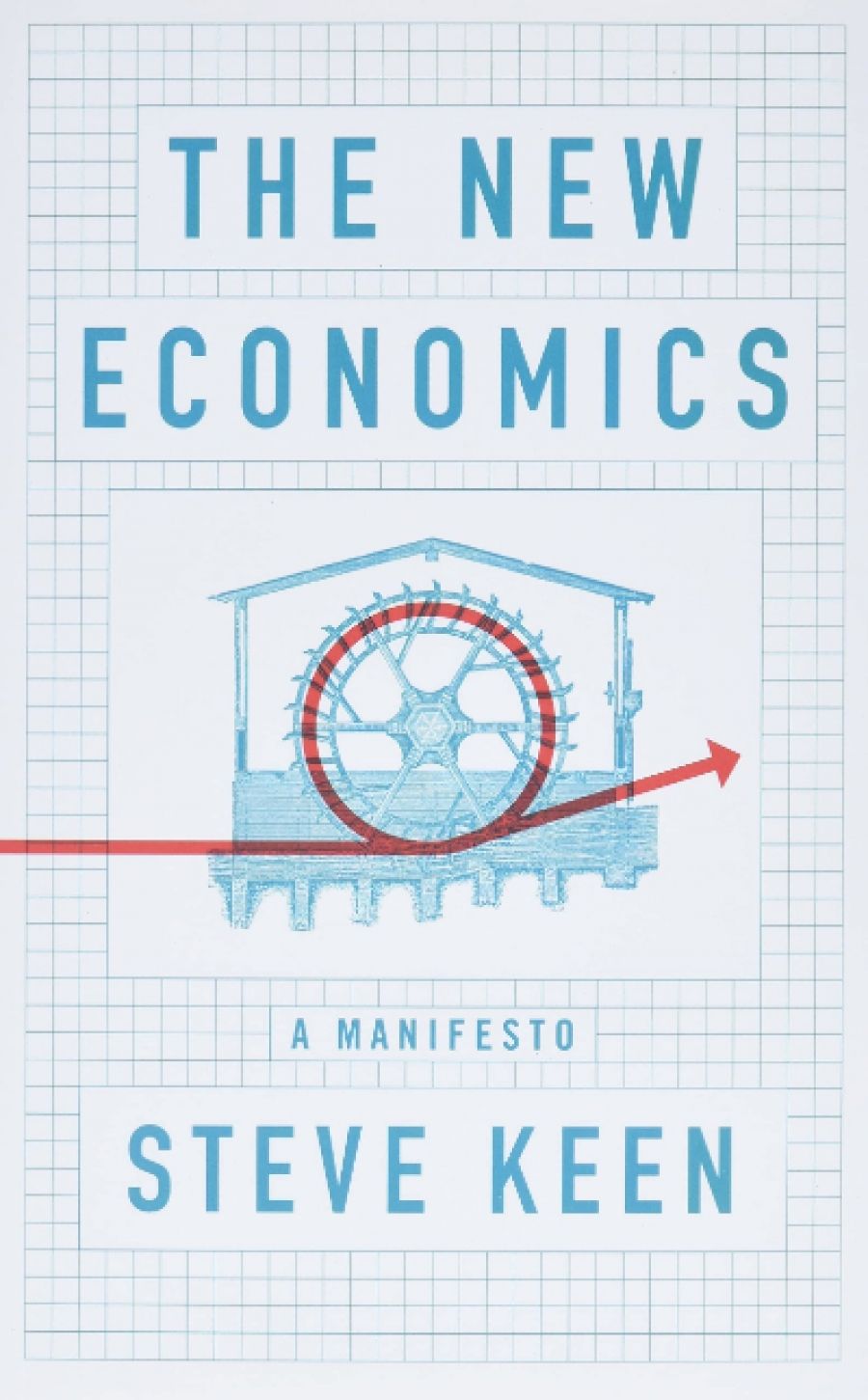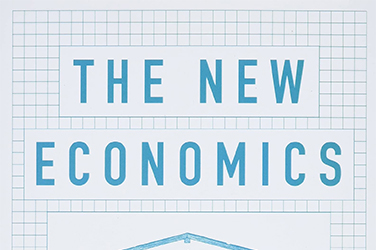
- Free Article: No
- Contents Category: Economics
- Review Article: Yes
- Article Title: Antinomian economics
- Article Subtitle: Steve Keen’s affront to received wisdom
- Online Only: No
- Custom Highlight Text:
In November 2011, amid the Occupy Movement that followed the 2008–9 recession, seventy-odd Harvard students walked out of their introductory economics course taught by Greg Mankiw, author of the world’s bestselling economics textbooks. The students protested that Mankiw’s faith-in-markets economics had little relevance for their crisis-riddled world. The walkout proved more than a campus stunt. Similar protests followed in universities across the world. Senior academics threw in support. New networks and organisations emerged, proposing alternative economics curricula, forums, and ideas. Their aim, as one campaigner put it, was to combat the ‘fantasy world of neoclassical economics – a faith-based religion of perfect markets, enlightened consumers and infinite growth that shapes the fates of billions’.
- Featured Image (400px * 250px):

- Alt Tag (Featured Image): Benjamin Huf reviews 'The New Economics: A manifesto' by Steve Keen
- Book 1 Title: The New Economics
- Book 1 Subtitle: A manifesto
- Book 1 Biblio: Polity, $26.95 pb, 218 pp
- Book 1 Readings Link: booktopia.kh4ffx.net/MXLGnM
Economics – Thomas Carlyle’s dismal science – is ever maligned, especially after a crisis. It also keeps bouncing back. This latest student-initiated attack did not overthrow the emperor. Not yet. A decade on, the rage still burns. Maverick Australian economist Steve Keen’s The New Economics: A manifesto is a program for disaffected economics students and, potentially, scripture for a reformed religion. Keen, who retired from London’s Kingston University in 2018, has long been a critic of what he calls neoclassical economics – the mainstream account of rational consumers with unlimited wants – including in his popular earlier work, Debunking Economics (2001). He takes this mission seriously. Keen ran for the Senate in the recent federal election on a platform informed by his work. He concludes this book by warning that neoclassical economics poses an ‘existential threat’ to ‘human civilization’. The stakes are high.
Keen’s charges against mainstream economics are damning. Intellectually, it promotes ‘ingrained dishonesty’ and ‘insane propositions’, modelling human behaviour in a manner that is less ‘rational’ than ‘prophetic’. The profession ignores evidence that contradicts accepted models and teaches those models as a monoculture without alternatives. Most damaging are the politics. Equilibrium models are stripped of power and class, and assume that income is merit-based. This view supports wealthy interests and lulls the indoctrinated towards a utopia where financial crashes seem unlikely and climate change trivial.
While this book follows a long line of heterodox thinkers proposing a ‘new’ economics, Keen’s principles are in a dialogue with the present. Following the 2008–9 crash, money can no longer be wished away in models as a substitute for barter, but must be recognised as fuelling economic activity, created through a banking system that makes economies dynamic but inherently unstable. Economies are, accordingly, complex systems not reducible to equilibrium equations. Energy is not nature’s free ‘gift’ but indispensable to any analysis of production. Assumptions in models should be reality-based, not simplifying fantasies.
Those acquainted with Keen will find a concise recapitulation of his lifelong projects. For the uninitiated, it is a highly readable affront to received wisdom. It also demands hard thinking. There are stratospheric excursions into mathematics and physics. Readers are directed to Keen’s computer-modelling program to test his claims. Other evidence – including a graph illustrating the tight correlation between global energy consumption and GDP growth – are chillingly clear.
Climate change is where Keen says economists have done their worst work, failing to incorporate the laws of thermodynamics that link output with energy. The main culprit is William Nordhaus, winner of the 2018 Nobel Prize for economics, who has declared that a six-degree rise on pre-industrial temperatures would only lead to an 8.5 per cent decrease in economic output. Such divergence from scientific consensus – a two-degree rise appears catastrophic for human life, let alone capitalist production – is only possible by ignoring tipping points, equating climate with weather, and assuming that most production can continue indoors. Yet these models seep into IPCC reports and stoke climate denialism.
Not everyone will be convinced. Critics – mainstream economists – may argue that Keen caricatures the profession and ignores the diverse work economists do today. Many share his concerns. Keen might reply that his target is the dross students are taught – Mankiw’s textbooks receive repeated scrutiny – while recent developments are mere modifications (‘rationality’ is now ‘bounded rationality’), not serious reassessments. Others might criticise Keen for presenting nothing new. Keen might say that’s the point. He catalogues dozens of decades-old, heterodox papers that neoclassical economists continually ignore.
Keen’s ‘manifesto’ is to make economics ‘more like a science and less like a religion’. Yet he also admits that economics is more in need of a Martin Luther-like ‘reformation of a degenerate religion than a standard scientific revolution’. As ever, then, economics remains suspended between the sacred and profane. What kind of reformation might economics undergo? If Luther challenged the Church’s role mediating between God and man, some heterodox economists today are similarly dismantling the sacerdotalism of the economics priesthood: the indulgence of formal mathematics; GDP as the measure of all things; and, for economist Kate Raworth, replacing the iconography of demand curves with a doughnut depicting the economy’s inner (basic needs) and outer (ecological) limits.
Keen doubles down on the maths. Policymakers like numbers, so why cede that authority to neoclassical orthodoxy? Where mainstream economists assume that economies are stable and tend towards equilibrium, Keen says that equilibrium is a fantasy ironing out the chaos and conflicts of capitalism. Economies are better understood as complex systems with emergent properties not built into the models and better studied using system dynamics measuring loops and fluctuations.
Replacing one sacred tongue for another – complexity for equilibrium – Keen might be accused of the ‘physics envy’ long levelled at economists. But Keen’s primary concern is with politics. Here, surprisingly, his disdain for equilibrium models echoes neoliberal progenitor Friedrich von Hayek, who also framed the economy as a complex system to argue market spontaneity was beyond government planning. Keen is no closet Hayekian. He advocates debt jubilees to quell private debt bubbles. And unlike Hayek, Keen quarrels with long-run equilibrium modelling not out of respect for market complexity but out of political urgency on climate action. Maybe markets will eventually balance. Can we afford to wait and see? As Keynes warned of long-run equilibrium predictions: ‘In the long run we are all dead.’


Comments powered by CComment